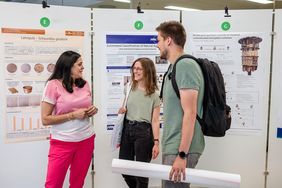
Lectures, Exhibitions, Innovation Walk - »Tag der Ingenieurwissenschaften« (Engineering Day) 2025 in Jena
The »Tag der Ingenieurwissenschaften« (Engineering Day) is an initiative launched by the »Allianz Thüringer Ingenieurwissenschaften« and has been held every year at Thuringian universities since 2022. The event aims to showcase the diversity of engineering research carried out at Thuringian universities. It also offers various partners at Thuringian universities an inspiring forum for dialogue, knowledge transfer, and new inspiration for applied research and technological innovation. Attendees can expect several keynote speeches and an accompanying exhibition. Researchers will be presenting innovative exhibits, prototypes, and applications at various stations, from intelligent mobility and environmental technology to digital solutions. The Innovation Walk, a moderated tour beginning at 2 pm, offers the opportunity for individual discussions and will show how research provides concrete answers to social challenges.
The Bauhaus-Universität Weimar is participating in 2025 with numerous contributions:
LECTURES:
9:40 am
»Wärmewende in Thüringen – Entwicklung einer Wohngebäude- und Heizungstypologie«
Helge Grüter-Bîrgaoanu, Bauhaus-Universität Weimar
Nearly a quarter of energy consumption in Thuringia is accounted for by space heating and hot water in residential buildings. In order to become climate-neutral by 2045, it will be necessary to find new solutions for heating. The Thuringian residential building stock was extensively analysed in the research project. A bottom-up model makes it possible to evaluate current energy requirements and shows how modernisation efforts can influence the path to a greenhouse gas-neutral heat supply.
10:20 am
»Radfahrende im Fokus vernetzter Mobilität« – Contribution from the Bauhaus-Universität Weimar’s CoCoMobility research group
Rebekka Kramm, Bauhaus-Universität Weimar
CoCoMobility (Vernetztes und kognitives Fahren), the cross-university research group, is investigating how automated and networked mobility can be designed safely, especially for vulnerable road users like cyclists. Four Thuringian universities are working together under the »Allianz Thüringer Ingenieurwissenschaften«, funded by the Thuringian »Ministerium für Bildung, Wissenschaft und Kultur«. The goal is to improve road safety in cities by developing driving technologies that accurately record human behaviour.
11:50 am
»Entwicklung eines multifunktionalen Fassadenbegrünungsmoduls zur Grauwasseraufbereitung«
Gloria Kohlhepp, Bauhaus-Universität Weimar
Growing cities are facing the challenge of using resources such as potable water sustainably. VertiKKA, the innovative façade module, combines greening, grey water treatment, and photovoltaic technology. Grey water is filtered through a special substrate and reused for irrigation or as process water. Plants benefit from the nutrients in the water, and the microclimate and energy requirements of buildings improve. The GrayToGreen research project is examining the long-term effects and scalability of the system.
12:10
»Luftreinigung mittels photonischer Oxidationstechnologien – Einsatz in biogenen und urbanen Anwendungsfeldern«
David Gaeckle und Moritz Pollack, Bauhaus-Universität Weimar
Gaseous pollutants in industry, agriculture and urban areas jeopardise the environment and health. Conventional air purification methods are frequently pushed to their limits. Photonic processes such as photocatalysis and photolysis offer an innovative approach for the targeted removal of pollutants. Their effectiveness is currently being investigated under laboratory conditions in order to better understand complex reaction mechanisms. The aim is to develop scalable solutions for its use in urban infrastructure, for example in stables or street lights.
EXHIBITIONS
»Wasser, Abwasser, Zukunft: Wie die Siedlungswasserwirtschaft unsere Städte grüner, gesünder und nachhaltiger macht«
Bauhaus-Universität Weimar, Professorship of Urban Water Management and Technologies for Urban Material Flow Utilization
In this exhibition, everything revolves around innovative approaches to water management. The exhibits give insights into current projects for wastewater treatment in façade greening, wastewater surveillance, and resource-friendly irrigation. The GrayToGreen project’s living research façade shows how grey water is treated with recycled materials using a test facility, substrate samples, and hands-on challenges. AMELAG TH uses wastewater analyses, AI, and mobility data for early detection of infection outbreaks such as coronavirus using real laboratory material and visualisations. The FarmWater project shows how purified wastewater can be turned into an agricultural resource using membrane and UV technology, including elements from the pilot plant and a study of Thuringia’s potential.
»Forschung trifft Praxis – Textilien, Luftreinigung und Kunststoffvermeidung«
Bauhaus-Universität Weimar, Professorship of Resource Management
This stand allows visitors to use a handheld NIR device to analyse the fibre composition of fibres they bring with them and learn about the current challenges involved in sorting and recycling used textiles. The exhibit will be moderated by Melanie Börmel.
The phoTech project brings together twelve small and medium-sized enterprises with five research institutions - including the Bauhaus-Universität Weimar - and develops photonic processes for cleaning indoor, urban, and industrial exhaust air. David Gaeckle and Moritz Pollack will be sharing insights in a short presentation, complemented by an exhibited reactor.
Thomas Haupt and Isabell Lange will be showing how research and teaching work together through a 360° tour of the »SCIP plastics« project. Aim of the project: To reduce plastics emissions in the environment in with a hands-on digital tour.
»Mit Wasserstofftechnologien experimentieren, planen, ausprobieren«
Bauhaus-Universität Weimar, Professur Energiesysteme
MobELF – the mobile energy lab – brings research and teaching together. The workshop cart, outfitted with measurement technology and equipment, enables students to carry out everything from practical experiments to complete energy systems. The goal is to fill the gap between school experiments and large-scale systems.
The h2-well dimensioning tool enables customised planning of hydrogen supply systems for mobility applications - from the power source to storage and transport. It supports the design of different scenarios for vehicle fleets.
NEP2N is a robotic platform powered by green hydrogen, developed in the Environmental Engineering Master's programme. The lightweight vehicle was designed for outdoor use and can be used to develop sustainable energy solutions.
Further information on the programme can be found at: https://www.eah-jena.de/forschung/tag-der-forschung
